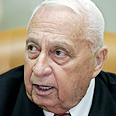
There are two states here today, that is already an established fact. They work side by side, but they think differently, act differently, and want different things.
The first state is made up of Likud members, and the second is made up of the general public, or, as they are called in polls, the Israeli adult population.
There is no other way to interpret the abysmal gaps in the results of polls conduct this week, which showed that one group was in favor of disengagement, while the second group rejects it.
The Israeli public wants the country to go to the polls on schedule, while Likud members want to push forward elections.
Likud members would like to see Netanyahu as prime minister, while the Israeli public prefers Sharon.
The person who really sharpened the contrast between the two ‘states’ and exposed the intense opposition to Sharon’s administration is former finance minister Benjamin Netanyahu, who resigned this week due to what he called a “moment of truth.” During this period, said Netanyahu, “I don’t want to lie to myself.”
Netanyahu spoke about his extensive soul searching, and described the months in which he was torn over what to do.
But today it is clear that Netanyahu’s decision to resign is, at best, a combined result of the voice of his conscience and political calculations.
Political calculations
A more cynical view is that Netanyahu’s resignation was motivated purely by political tactical considerations, born out of two polls he conducted, one of which was released three days before his resignation.
The results of that poll have been kept secret by Netanyahu’s aides, but on the same day that the poll was released, an Israel Radio poll revealed the stunning statistic according to which 51 percent of Likud members think that Sharon should not take part in the next Likud leadership race.
No Israeli prime minister has received such a rejection from his own party. Netanyahu recognized that there was an obvious problem, and immediately ordered Yaakov Katz, his personal pollster, to conduct his own questionnaire.
When the results to that poll became known, Bibi’s aides were rushed to a meeting at his home in Caesarea, in order to discuss Netanyahu’s fateful next step: What would happen to him politically if he resigned during the present government’s term.
If Netanyahu’s own poll results were even remotely similar to the public survey, he would have been aware of a number of key statistics. If Likud primaries were to be held with two contenders, Sharon and Netanyahu, 53 percent of Likud members would vote for Netanyahu.
But if the leadership candidates were to include Sharon, Netanyahu, and Landau, the picture would have changed: Sharon would have received 36 percent of the vote, Netanyahu would win 40 percent, and Landau would take 16 percent of the ballots.
These results made Netanyahu realize that this was his last chance – if he would not resign now, he would not be able to run against Sharon. It took less than 24 hours for Netanyahu to resign after this discovery.
Sharon could lead country without Likud
Meanwhile, a poll conducted by Yedioth Ahronoth, Mina Tzemah, and Dahaf found that a decisive majority supports Sharon’s disengagement plan – with 58 percent of respondents saying they support the move, compared to 33 percent of those who oppose it. Among Likud members, the opposite is true: 54 percent oppose the pullout.
A large majority of the public, 64 percent, think that Sharon should be allowed to continue to lead the country until the next elections, compared to 29 percent who think that elections should be brought forward. Likud members again took an opposite view, with 60 percent saying that elections should be held ahead of time.
The resignation of Netanyahu has not shocked the majority of the public – 49 percent of respondents said that Bibi’s departure would have no effect on the Israeli market, while 15 percent said that it would be good for the economy, and 12 percent were unsure.
In other words, 76 percent of the general public don’t see Netanyahu’s resignation as a catastrophe.
The big split
But the most exciting results were found to the question of what would happen if the Likud would split into two factions, or if Sharon would lead a coalition of parties with Labor’s Shimon Peres and the Shinui Party’s Tommy Lapid.
In answer to the first question, which asked respondents what would happen if Likud were to split into two parties, with Sharon leading one faction, and Netanyahu heading the second, the poll showed that Sharon’s party would take 29 mandates, compared to the 14 mandates that Netanyahu’s party would win.
In regards to what would happen if Sharon were to lead a joint list with Peres and Lapid, the poll revealed that such a party would win an impressive 38 mandates, leaving Netanyahu’s Likud far behind in any elections.















